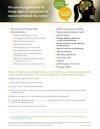Are you a registered MDC client? If not, register today to access our programs and services!
Did you know healthcare professionals, researchers, friends, family members and people with neuromuscular disorders can all register as MDC clients?
- Poor balance with frequent falls
- Muscle weakness
- Difficulty walking or running
- Difficulty performing sports
- Difficulty going up stairs
- Difficulty rising from a chair or getting up from lying position
- Difficult getting on or off the toilet
- Difficulty raising or keeping your arms up
- Resulting in loss of function muscle loss, soreness, cramps or pain
- Fatigue, daytime sleepiness or morning headaches
- Difficulty breathing including or especially when lying down
- Drooping eyelids
Do you recognize any of these symptoms in you or someone you know?
Download this form and talk to a healthcare professional.
Visit muscleweakness.ca for more information and to find out who else you can talk to about your signs and symptoms.
It is an exciting time for neuromuscular research. We are seeing incredible advancements including more treatments and clinical trials coming to Canada. However, research can be complex and overwhelming which is why MDC’s dedicated Research Hotline is here to answer all research questions! Contact our Research Hotline by calling 1-800-567-2873 ext 1114 or emailing research@muscle.ca and our research team will provide you with accurate and timely answers.

